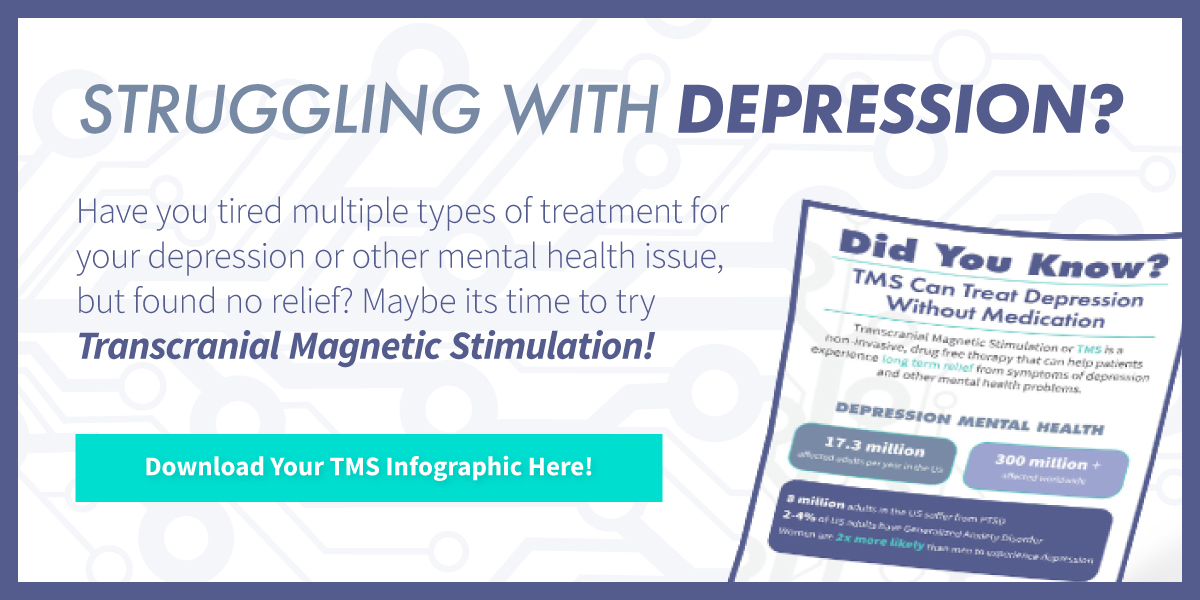While wintertime may be full of joy and family fun for many people, there are also those who struggle with mental health issues during these winter months. They can’t seem to shrug off the feelings of sadness, loss of interest, and fatigue. Many times, they will brush these feelings off as nothing, but these are symptoms of seasonal depression, also known as seasonal affective disorder (SAD). There are treatment options out there to help the person struggling with seasonal depression. Knowing the symptoms of seasonal depression can help you recognize when you or a loved one needs help. In this blog, we will discuss the symptoms of seasonal depression and the treatment options available.
Interested in Ketamine Infusion Therapy? Click Here to Learn More!
Symptoms of Seasonal Depression
The symptoms and severity of seasonal depression will vary from person to person but the general signs to look out for include:
- Feeling listless or sad most of the day, almost every day
- Loss of interest in activities
- Low energy
- Oversleeping and/or problems staying awake
- Cravings for carbohydrates or other appetite changes
- Overeating and weight gain
- Difficulty concentrating
- Feeling hopeless, guilty, or worthless
- Suicidal thoughts
- Irritability
- Increased or new anxiety
While most people who experience seasonal depression have it in the winter and fall months, it is possible to experience seasonal depression in the summer and spring months as well. Summer seasonal depression can present different symptoms such as:
- Trouble sleeping
- Poor appetite
- Restlessness and/or agitation
- Anxiety
- Bursts of violent behavior

For those struggling with seasonal depression, the holiday season can be extra hard to manage.
Treatments for Seasonal Depression
Just like how people will experience symptoms of seasonal depression differently, people will also react differently to the treatments available. Talk to your health care provider to see which option is the best for you and your situation. Treatment options include:
- Ketamine Infusion Therapy – Ketamine infusions work by “rewiring” the brain to create stronger and better neuron functions. This treatment option is ideal for those who have not found relief from other options or those with severe symptoms. Patients can start to feel the effects after just one treatment session.
- Phototherapy – Also known as light therapy, phototherapy is one of the most well-known treatments for seasonal depression. A lightbox projects a light that mimics natural outdoor light. Research shows that this light causes chemical changes in the brain that lifts the patient’s mood and ease other symptoms.
- Antidepressants – When symptoms are more severe, a doctor may prescribe antidepressants. Antidepressants work to change the chemicals in the brain to help the patient improve mood and lessen other symptoms. Antidepressants can be used in the short-term or long-term depending on the severity of symptoms. Patients may need to try several types of antidepressants before finding one that works for them.
- Therapy – For some patients, talking to a therapist can help greatly reduce the symptoms of seasonal depression. Therapists and psychiatrists can provide the patient with coping strategies and help the patient understand their feelings.
- Vitamin D – In some cases, seasonal depression can be attributed to a lack of vitamin D received in the winter months. Taking a daily vitamin D supplement can help reduce the symptoms of seasonal depression.
Seasonal depression can be debilitating for those experiencing it but knowing the symptoms can help you get the help that you or someone you love needs. At this time of year, it is especially important to look out for the symptoms of seasonal depression since this is when it is most prevalent. If you or someone you know is suffering from mental health problems, be sure to contact a medical professional. To learn more about the mental health services offered by Cutting Edge Integrative Health, visit our website today.


